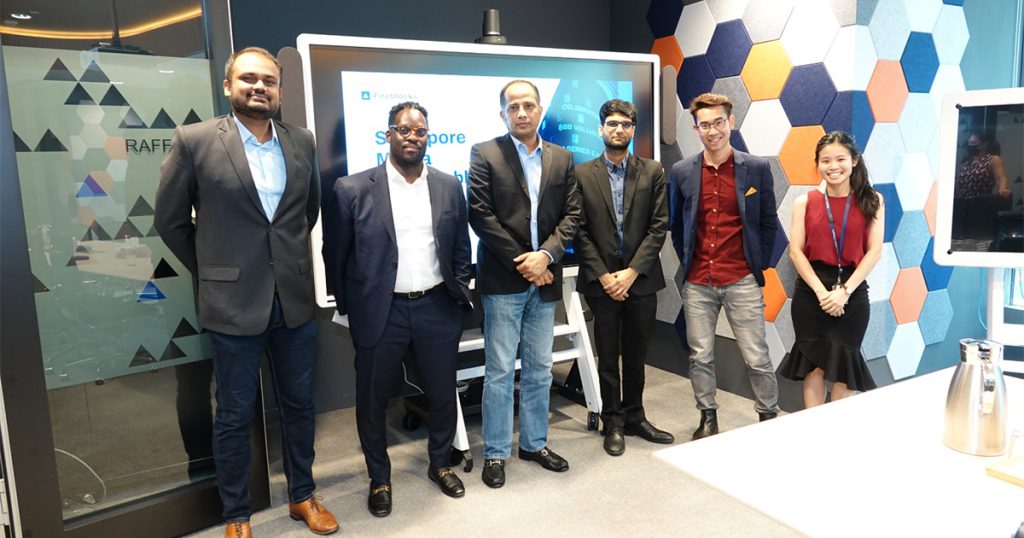The crypto winter has led to a change in mindset among investors, builders, and regulators alike. Weak projects are being weeded out of the market, while the rest make their case for long-term survival and growth.
It’s no telling when a recovery will actually happen, but preparations for it already seem to be underway.
At a roundtable discussion organised by digital asset company Fireblocks on Wednesday (July 13), the company’s executives Stephen Richardson and Sagar Sarbhai spoke with Coinhako’s VP of Strategy Raghav Sood, and the Monetary Authority of Singapore’s (MAS) Chief FinTech Officer Sopnendu Mohanty.
Here are the key takeaways from their conversation on making it through to spring and summer.
Seek education, not profits
Throughout most of 2021, the narrative around crypto was one of exponential gains. From memecoins to NFTs, projects were rallying based on their potential to go viral rather than their actual utility.
This no longer seems to be the case.
“You don’t want to use the winter as a time to pitch crypto as something which will make people rich,” says Sood.
“Rather, it’s a time to sell them on the benefits of the underlying technology and the value in these underlying chains. The projects that are building value during this quieter period will be the ones to watch out for when spring or summer comes around.”

With this in mind, Coinhako has geared its focus to building awareness among its users. “As a company, we’re focused a lot more on education these days instead of sales.”
Sood believes that crypto exchanges have a responsibility to support the growth and development of the space.
“You don’t just want to be an on- and off-ramp, moving money in and out of the space. You want to make sure that the money which enters the space has the opportunity to move into areas which are driving value.”
No more Doge?
“Driving value” being the key sentiment, Mohanty breaks it down into three simple questions: “Anytime someone comes to me with a token, I ask, ‘What is the economic value? Why are we doing it? Can I explain it to my son?'”
To illustrate, Mohanty speaks about a method of verifying credentials, which MAS is working on alongside the Bank of Ghana.
“In Western Africa, typically, there are trade bureaus for financing. You tell the trade bureau about yourself and they decide to finance you. It’s centralised, expensive, membership-driven, and people can be excluded. A lot of forces which prevent greater access to finance.”

We are building a platform which will allow decentralised credentials. A small business can hold a wallet where every required credential can be stored as a verified token. This can then be presented to a bank. Through this, you solve the infrastructure problem and you make the system much more inclusive.
– Sopnendu Mohanty, Chief FinTech Officer, MAS
Mohanty believes that this is the kind of token which drives economic value. It has a real purpose which can easily be explained to other people. “With Dogecoin, it’s hard to explain what it does.”
The case for DeFi
The market crash has exposed dozens of crypto projects for their lack of value, however, it seems to cast a flattering light upon the idea of decentralised finance (DeFi).
“From a technology point of view, I think you can look at the after effects of two different markets: centralised and decentralised,” says Richardson. “In general, the DeFi markets, throughout all the volatility, maintained market structure.”
While centralised funds and lenders continue to collapse due to poor risk management, DeFi protocols are operating as they always have.
At its peak, the DeFi space had a high of S$252B in TVL as compared to the current TVL at US$75B. A 70.3% ?? from the ATH.
— Chain Debrief (@ChainDebrief) July 6, 2022
? Is the DeFi space safe? pic.twitter.com/SKvvSzpBwA
DeFi protocols liquidated when they were meant to, they over-collateralised, and they returned money to investors.
– Stephen Richardson, Head of APAC, Fireblocks
As such, DeFi protocols could help combat human risk management, which is something at play, not only in the crypto space, but traditional finance as well.
“Bill Hwang from Credit Suisse, MBS and CBS securities – it’s not something we haven’t seen.”
“A DeFi protocol doesn’t know if it’s handling assets from a billion-dollar fund or a small investor. It takes market information and executes. Such smart contracts could help take out some of the risk that exists in the space.”
Regulations aren’t the enemy
Further regulations are inevitable in the crypto space, but for companies like Fireblocks and Coinhako, they aren’t a cause for fear. “The serious players are ready for regulations,” says Sarbhai.
As someone from the TradFi industry, Sarbhai states that this isn’t a circumstance unique to the world of crypto and digital assets. It’s something finance companies have had to deal with time and time again.
“For example, [following the financial crisis] in 2008, we saw the Financial Stability Board (FSB) come up with new guidelines and reforms.”
From 27 April 2022, Coinhako will be introducing a series of measures that will affect how you send and receive crypto to and from external wallets moving forward.
— Coinhako (@coinhako) April 25, 2022
Learn more here ? https://t.co/BUjBxaY6kR
Richardson adds that the regulatory environment is actually one of the reasons why Fireblocks chose Singapore for its headquarters.
“It’s beneficial to be on the side of a regulator, which has taken a pragmatic and responsible approach. As other [countries] are looking at digital assets, they’re referencing the [guidelines laid down by] MAS.”
“We have a good idea of the direction in which regulations are headed, and this allows us to build accordingly.”
Featured Image Credit: Coinhako










